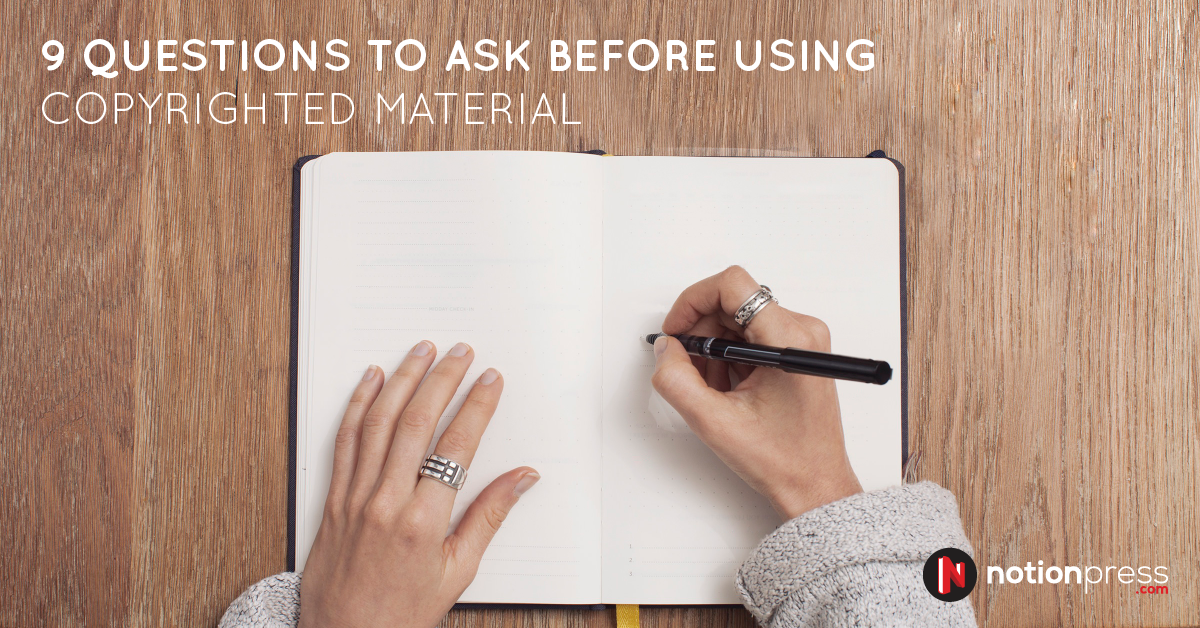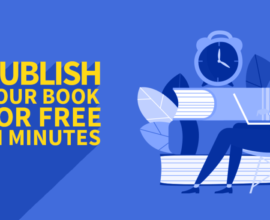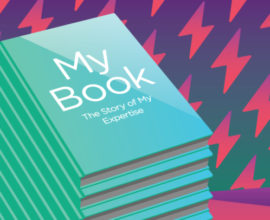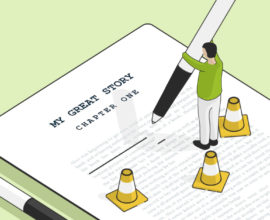9 Questions To Ask Before Using Copyrighted Material
Everyone knows the secret of creative ideation and writing; ideas don’t just pop out of your head, they formulate out of inspiration. Inspiration can come from anywhere and at any time, and once you get inspired, your writing prowess will take center stage. At certain instances, while you are writing the story, you may want to include a quote or reference – a character/scenario that exists in the world of literature but was not created by you. At such instances, the issue of copyright infringement comes in. Copyright is one of the legal issues that every author needs to be aware of. Using copyrighted material can get an author in serious legal trouble. However, there are ways of using copyrighted material without getting you in trouble.
Copyrights are created when an author feels the need to protect his/her material. This effectively gives the author complete and exclusive control over the material. If the author spots plagiarism of his/her copyrighted material, he/she can claim copyright infringement, which is a serious offense. If you feel the need to use copyrighted material, you can do so by a method known as fair dealing.
What is fair dealing?
Fair dealing comes into play when you use existing material that doesn’t fall under copyright laws. Copyright laws vary from country to country, so make sure you thoroughly read every country’s laws before you decide to use the existing material in a fair way. In this blog, we share with you how to stay on the good side of Indian and Singaporean copyright laws.
Usage of the original content falls under fair dealing if:
- The content is for non-commercial use: Whenever you borrow content to use for non-promotional purposes such as using it for your interest, educative purposes or research, you are safe from copyright increment cases.
- The content is being reviewed: You will often come across review and discussions about works of literature, especially in online forums or influencer pages. In such cases, the owner of the copyrighted material cannot file for copyright infringement. In fact, the owner would benefit here, as his/her work is getting directly promoted through such discussions.
- The content is subject to news and source of information: If copyrighted material is used as a source of reference or for informative purposes, it is safe from infringement offenses.
- The content is adapted into a different literary form: If the original content is used as a reference point to create new content forms, then the new content will not be scrutinized for infringement.
- The length of the new content: If new content uses only 300-400 words of the original content, then the new content is safe from infringement.
- The new content does not hurt the market value of the original content: If the new content is promoted in a manner that it doesn’t interfere with the sales of the original content, then the new content will not be scrutinized for infringement.
Indian copyright laws only cover the first three scenarios as fair dealings, while Singapore laws cover all six. Bear in mind that the concept of fair dealings is very vague among copyright laws in all countries; it can be tough to win a case should you be caught for infringement. Your best bet is to get permission from the owner of the copyrighted content.
What you can and can’t copyright?
Before you approach the Copyright Office to purchase copyright for your content, make sure you understand copyright laws. Here’s a quick look at the material that can and can’t be copyrighted.
Can be copyrighted:
- Literary work you have done from scratch: This includes the characters of your book and series if you have written one, excluding the idea or the narrative of your story
- Blogs you have written: Make sure you own the domain name
- Merchandise that is sold to promote your book
- Your author website
Can’t be copyrighted:
- Book title and your pen name
- Facts
- Common symbols
- Short phrases
Questions to ask before you use copyrighted material:
Before you take the risk of using copyrighted material, ask yourself some questions. Let’s say you are writing a book; here are the types of questions that you must ponder heavily upon.
- What does the law say about copyright?
The Indian copyright laws can be traced back to the British era. In 1957, the official Copyright Act was formulated. Under the Act, an author can copyright his/her work stating first ownership. However, in case of contracts, the author’s employer gains first ownership. Chapter 63 of the Copyright Act, Singapore was passed in 1987 and states that authors will automatically receive copyright if the work they present is in a tangible form.
- Do you have explicit permission to use the content?
Getting permission is essential, as it saves you the trouble of facing repercussions over any issues with the copyrighted content. Try establishing a good rapport with the curator of the original content, as it will serve as a sweetener when you ask for permission.
- Are you using the content for promotional purposes?
Since you are writing a novel for commercial and promotional reasons, you are taking a risk by using copyrighted content.
- How much of the copyrighted material can you use?
If you are using copyrighted content, make sure not to duplicate the entire content blindly. You can argue about fair dealing rights if you use 300-400 words.
- In what way are you reproducing the copyrighted material?
You are writing a novel, so in most cases, you are reproducing the original content for your benefit and not for public service needs. So, be careful about how the original content is being reproduced.
- What is the duration of the copyright?
Copyright duration as per Indian Copyright laws states that literary works have a maximum duration of 60 years. Singapore laws give copyright a lifetime of 70 years.
- What is the punishment for copyright infringement?
In India, the minimum punishment for copyright infringement is imprisonment for six months and a fine of Rs. 50, 000, while the maximum punishment, in case of a repeat offence, is Rs. 1 Lakh and one-year imprisonment.In Singapore, punishment is $10,000 for each piece of plagiarised material and an imprisonment of five years.
- What happens to authors who plagiarise content?
Plagiarism is the ultimate offense, so authors who are convicted of copyright infringement will effectively lose their recognition among the literary world and will have a very tough time getting good deals from publishers.
- What must you do if your work is plagiarised?
If you notice your content being used illegally, approach a court that has the jurisdiction, and file a civil remedy.
Other legal issues authors should extra-careful about:
Copyright infringement isn’t the only issue. You must be careful with other legal issues that can damage your reputation as an author.
- Defamation:
Writing false information or mocking a person in your novel can lead to cases of defamation, which is a punishable offense.
- Breach of contract:
When you meet a traditional publisher, you will be asked to sign a contract that ties you with the publisher. All the work you release will be published exclusively, so if you try to release a book through some other source, you will be subject to breach of contract violations.
- Violation of publicity rights:
Anybody has the right to promote themselves, but if you try to unlawfully promote some other person through your books and do so in a negative way, you could be in trouble for publicity rights violation.
Trademark infringement:
Like copyright infringement, trademark infringement refers to illegally using trademarks like brand logos, official titles and products.
If you are planning to either purchase copyright or double-check to make sure you are not breaching copyright laws, do get your novel published through Notion Press, a popular self-publishing company that is highly sought-after in India and Singapore.






